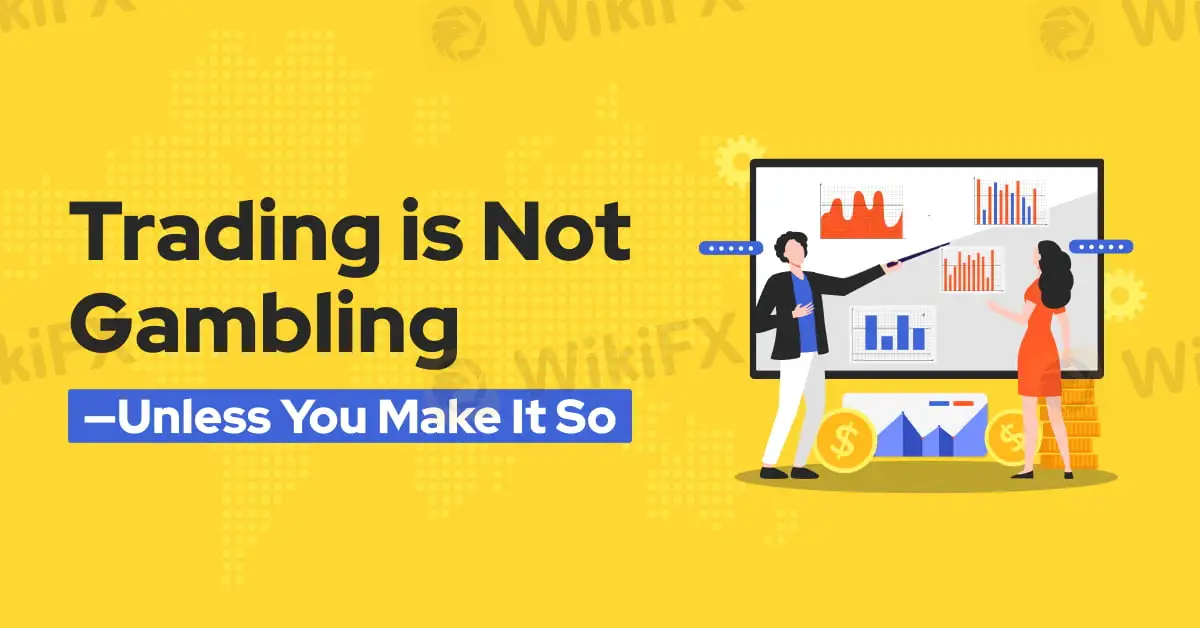Trading is Not Gambling—Unless You Make It So
Abstract:In the world of online trading, a common misconception persists: trading is often seen as no different from gambling. This belief is particularly prevalent among newcomers, who may view the financial markets as a fast-paced game where winning is just a matter of luck. But trading, when done correctly, is far from mere chance!

In the world of online trading, a common misconception persists: trading is often seen as no different from gambling. This belief is particularly prevalent among newcomers, who may view the financial markets as a fast-paced game where winning is just a matter of luck. But trading, when done correctly, is far from mere chance. Professional traders follow strategies built on research, risk management, and disciplined decision-making. However, when trading is approached without these critical elements, relying solely on emotion or impulse, it can quickly become indistinguishable from gambling.
At its core, trading is about taking calculated risks. Each trade involves careful assessment, analysis, and a clear understanding of the potential outcomes. Successful traders do not simply “bet” on market movements; they make informed decisions based on data, patterns, and proven strategies. The difference lies in the mindset. A gambler relies on hope and the thrill of the unknown, often doubling down on losses in a desperate attempt to recover. A skilled trader, on the other hand, operates within a structured plan, using established risk management techniques to protect capital and limit exposure. The outcome of each trade is less about luck and more about methodical risk management.
A significant danger for traders is allowing emotions to take control. Emotions such as greed, fear, and FOMO (fear of missing out) can cloud judgment, leading traders into reckless decisions that feel less like strategy and more like chasing quick wins. For instance, when greed takes over, traders might over-leverage or over-trade, hoping to accelerate profits. Similarly, FOMO can drive traders to enter volatile markets without a clear strategy, simply because they fear missing out on potential gains. These impulsive actions lack the discipline required for long-term success, aligning more with the behaviour of a gambler than that of a disciplined trader.

In fact, trading without a clear risk management plan is essentially gambling. Effective risk management is the foundation of professional trading, where each trade is weighed carefully to avoid unnecessary losses. This involves setting stop-loss levels, deciding on acceptable risk per trade, and knowing when to exit a position. Without these protections in place, a trader becomes vulnerable to significant losses, caught in a cycle of impulsive trades that leads to emotional fatigue and financial damage. This spiral often ends in burnout, as the initial excitement of quick wins gives way to the stress and despair of bigger losses.
To avoid this cycle, traders must recognize the importance of patience and discipline. Progress in trading does not come from one lucky trade or a string of wins—it is built gradually, through consistent learning and the steady refinement of strategies. Mastering the basics of risk management, technical analysis, and emotional discipline takes time, but it is this commitment to methodical improvement that distinguishes a true trader from someone merely gambling in the markets.
For traders serious about their long-term success, trading must be viewed not as a high-stakes gamble, but as a skill that requires knowledge, practice, and a deep respect for the risks involved. Trading becomes gambling only when traders abandon strategy for emotion, chasing quick profits without regard for risk. By focusing on calculated decisions, setting realistic goals, and maintaining emotional control, traders can avoid the pitfalls of impulsive trading and move toward a sustainable path of growth and success.
So, if you find yourself trading on instinct rather than strategy, it is time to step back and reassess. Ask yourself: are you trading to win, or simply gambling in hopes of a lucky break? The answer to that question will determine whether your trading journey leads to steady progress or to the destructive cycle of gambling habits.

Read more

WikiFX Review: Is IVY Markets Reliable?
IVY Markets, established in 2018, positions itself as a global brokerage offering a diverse range of trading instruments, including Forex, Commodities, Cryptocurrencies, and Stocks. The platform provides two primary account types—Standard and PRO—with a minimum deposit requirement of $50 and leverage up to 1:400.

Germany's Election: Immigration, Economy & Political Tensions Take Centre Stage
Germany is set to hold a crucial general election on 23 February 2025, with voter frustration over migration emerging as a dominant issue.

ED Exposed US Warned Crypto Scam ”Bit Connect”
The Indian Enforcement Directorate (ED) recently exposed a crypto Scam from a firm called Bitconnect. During the investigation, which took place on February 11th and 15th, 2025. The authority recovered bitcoin worth approximately Rs 1,646 crore & Rs 13.50 Lakh in cash, a Lexus car, and digital devices. This investigation was conducted under the provisions of the Prevention of Money Laundering Act (PMLA) of 2002.

XTB Secures Chilean License, Expands Latin America Footprint
XTB gains a securities agent license in Chile, boosting its Latin America presence. The broker plans to offer stocks, ETFs, and derivatives to local investors.
WikiFX Broker
Latest News
Pi Network Mainnet Launch: Game-Changer or Crypto Controversy?
GlobTFX Users Report Same Issue! But Why?
Rate Cut or Not? It Depends on Trump’s Policies
Why Do You Keep Blowing Accounts or Making Losses?
eToro Adds ADX Stocks to Platform for Global Investors
B2BROKER Launches PrimeXM XCore Support for Brokers
Germany's Election: Immigration, Economy & Political Tensions Take Centre Stage
WikiFX Review: Is IVY Markets Reliable?
WikiFX Community Creator Growth Camp
Effect of Tariffs on Gold and Oil Prices
Rate Calc

